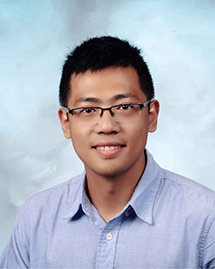Seminars
Dr. Jiaxin Zhang
Computer Science and Mathematics Division
Oak Ridge National Laboratory
A Nonlocal Optimization Method for Inverse Design Problem

ABSTRACT: Computational inverse design aims to use mathematical optimization algorithms and automate the search for structures and materials. The ultimate goal is to pursue desired performance metrics and generate the best possible design. Much of this progress is made by gradient-based algorithms, which are promising methods to efficiently search the enormous degrees of freedom in high-dimensional design space. However, existing local-gradient-based optimization approaches lack nonlocal exploration ability required for escaping from local minima in non-convex landscapes. In this work, we propose a nonlocal optimization method with novel directional Gaussian smoothing (DGS) operator to address this challenge. Compared with the local gradient, the DGS gradient allows for a large smoothing radius to capture the global structure of loss landscapes. A deterministic Gauss-Hermite quadrature is used to develop a DGS gradient estimator with higher accuracy than Monte Carlo estimators. The nonlocal optimization method has its advantages on portability and flexibility to naturally incorporate the parameterization, physics simulation (e.g. FEM, CFD, MD, DFT, etc.), and objective formulation together to builds up an effective inverse design workflow. The methodology is demonstrated by structural topology optimization problems and nanophotonic device design examples. Our method shows superior performance with faster convergence compared with classical local gradient approaches in structural and materials design.
BIOGRAPHY: Dr. Jiaxin Zhang is a Research Staff in Computational Science and Mathematics Division (CSMD) at Oak Ridge National Laboratory. He received his Ph.D. in Civil Engineering and a dual M.S. in Applied Mathematics & Statistics from Johns Hopkins University in 2018. He then joined ORNL as a postdoc in Scientific Computing Group in National Center for Computational Science (NCCS). His research focuses on robust and scalable machine learning (ML), computational design optimization and uncertainty quantification (UQ), with an interest in applications of ML, optimization and UQ for computational mechanics, materials design, advanced manufacturing and robotic systems.